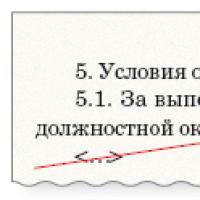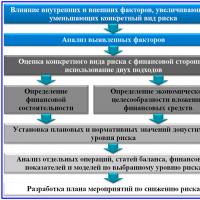New law on watch recycling. Why should overtime work not exceed the regular schedule? The duration of overtime work should not exceed
The Labor Code of the Russian Federation determines the daily number of working hours. However, the employer is authorized to extend the working day if necessary. In this case, we are talking about recycling.
Remember that workers' rights must be respected at the legislative level. You can learn more about the basics of labor protection in the Russian Federation. Next, let’s look at the issue of processing.
According to the standards of the Labor Code of the Russian Federation, the daily working hours should not exceed (Article 94 of the Labor Code of the Russian Federation):
- 4-6 hours - for minors working during vacations;
- 2-4 – for citizens receiving secondary or higher education and combining study with work;
- 8 hours with a 36-hour week for employees of enterprises with dangerous or harmful working conditions, with a 30-hour week – 6 hours;
- 12 – with a 36-hour week for employees of enterprises with moderate working conditions.
According to Article 97 of the law in question, overtime or overtime is the performance of work beyond the established schedule and norm. The initiator of processing is the management party.
Issues revealing the principles of introducing processing are regulated Article 99 of this code. According to the content of the article in question, in some cases an employee cannot be forced to perform overtime work against his will. The employee’s consent to overtime is recorded in writing and sealed with his personal signature.
The reasons for involving an employee in processing may be the following:
- If there is an urgent need to complete important work that was previously started but not completed for production reasons;
- During forced repairs of mechanisms and buildings, the failure of which may lead to a global suspension of the work process;
- In case of non-appearance of the replacement employee, if the work is continuous.
By law, the employer is authorized to oblige an employee to perform overtime work without his written consent if the employee’s participation is required:
- In operational actions to prevent a disaster and eliminate the danger of an emergency;
- In order to eliminate disruptions in the supply of heat energy, hot and cold water, natural gas;
- In cases of saving the lives of citizens under martial law or a state of emergency.
In all other cases forcing employees to recycle is unacceptable. Assigning overtime work on any basis is not legal in relation to pregnant women and minor employees.
Like other Federal laws, the current Labor Code of the Russian Federation regularly undergoes necessary amendments. Recent changes in the provisions of this law regulating the nuances of processing, submitted June 19, 2017. The amending document was the Federal Law “On Amendments to the Labor Code of the Russian Federation”.
The introduced amendments to the Labor Code of the Russian Federation determine the rules for recording overtime work and additional hours. At the same time, it is clarified that the payment for processing should be increased.
Search Lectures
The duration of overtime work should not exceed 4 hours for each employee for two consecutive days and 120 hours per year.
Labor Code of the Russian Federation, Article 93. Part-time work
By agreement between the employee and the employer, a part-time working day (shift) or a part-time working week can be established both upon hiring and subsequently. The employer is obliged to establish a part-time working day (shift) or part-time working week at the request of a pregnant woman, one of the parents (guardian, trustee) with a child under the age of fourteen years (a disabled child under the age of eighteen years), as well as the person carrying out caring for a sick family member in accordance with a medical certificate issued in the manner established by federal laws and other regulatory legal acts of the Russian Federation.
When working part-time, the employee is paid in proportion to the time he worked or depending on the amount of work he performed.
Part-time work does not entail for employees any restrictions on the duration of the annual basic paid leave, calculation of length of service and other labor rights.
Labor Code of the Russian Federation, Article 96. Night work
Night time is the time from 22:00 to 6:00.
The duration of work (shift) at night is reduced by one hour without further work.
The duration of work (shift) at night is not reduced for employees who have a reduced working time, as well as for employees hired specifically to work at night, unless otherwise provided by the collective agreement.
The duration of work at night is equal to the duration of work during the day in cases where this is necessary due to working conditions, as well as for shift work with a six-day work week with one day off. The list of specified works may be determined by a collective agreement or local regulations.
Guarantees and benefits provided to women in connection with motherhood apply to fathers raising children without a mother, as well as to guardians (trustees) of minors (see Article 264 of the Labor Code of the Russian Federation).
The following are not allowed to work at night: pregnant women; workers under the age of eighteen, with the exception of persons involved in the creation and (or) performance of artistic works, and other categories of workers in accordance with this Code and other federal laws. Women with children under three years of age, disabled people, workers with disabled children, as well as workers caring for sick members of their families in accordance with a medical certificate issued in the manner established by federal laws and other regulatory legal acts of the Russian Federation , mothers and fathers raising children under the age of five without a spouse, as well as guardians of children of the specified age, may be involved in night work only with their written consent and provided that such work is not prohibited to them for health reasons in accordance with the medical report. At the same time, these employees must be informed in writing of their right to refuse to work at night.
Labor Code of the Russian Federation, Article 101. Irregular working hours
Irregular working hours are a special work regime, according to which individual employees may, by order of the employer, if necessary, be occasionally involved in the performance of their labor functions outside the established working hours. The list of positions of employees with irregular working hours is established by a collective agreement, agreements or local regulations adopted taking into account the opinion of the representative body of employees.
Labor Code of the Russian Federation, Article 106. The concept of rest time
Rest time is the time during which an employee is free from performing work duties and which he can use at his own discretion.
Labor Code of the Russian Federation, Article 107. Types of rest time
Types of rest time are:
Ø breaks during the working day (shift);
Ø daily (between shifts) rest;
Ø days off (weekly uninterrupted rest);
Ø non-working holidays;
Ø vacation.
Labor Code of the Russian Federation, Article 114. Annual paid holidays
Employees are provided with annual leave while maintaining their place of work (position) and average earnings.
Labor Code of the Russian Federation, Article 115. Duration of annual basic paid leave
Annual basic paid leave is provided to employees for 28 calendar days.
Annual basic paid leave of more than 28 calendar days (extended basic leave) is provided to employees in accordance with this Code and other federal laws.
Labor Code of the Russian Federation, Article 122. Procedure for granting annual paid leave
Paid leave must be provided to the employee annually.
The right to use vacation for the first year of work arises for the employee after six months of continuous work with this employer. By agreement of the parties, paid leave may be granted to the employee before the expiration of six months.
Before the expiration of six months of continuous work, paid leave at the request of the employee must be granted:
for women - before maternity leave or immediately after it;
employees under eighteen years of age;
employees who have adopted a child (children) under the age of three months;
in other cases provided for by federal laws.
Leave for the second and subsequent years of work can be granted at any time of the working year in accordance with the order of provision of annual paid leave established by a given employer.
Payment and labor regulation.
Labor Code of the Russian Federation, Article 129.
Basic concepts and definitions
Wages (employee remuneration) - remuneration for work depending on the qualifications of the employee, complexity, quantity, quality and conditions of the work performed, as well as compensation payments (additional payments and allowances of a compensatory nature, including for work in conditions deviating from normal, work in special climatic conditions and in areas exposed to radioactive contamination, and other compensation payments) and incentive payments (additional payments and incentive allowances, bonuses and other incentive payments).
Tariff rate is a fixed amount of remuneration for an employee for performing a standard of work of a certain complexity (qualification) per unit of time, without taking into account compensation, incentives and social payments.
Salary (official salary) is a fixed amount of remuneration for an employee for the performance of labor (official) duties of a certain complexity for a calendar month, excluding compensation, incentives and social payments.
Basic salary (basic official salary), basic wage rate - minimum salary (official salary), wage rate of an employee of a state or municipal institution carrying out professional activities in the profession of a worker or position of an employee, included in the corresponding professional qualification group, excluding compensation, incentives and social payments.
Labor Code of the Russian Federation, Article 131.
What is the maximum duration of overtime work for an employee?
Forms of remuneration
Payment of wages is made in cash in the currency of the Russian Federation (in rubles).
In accordance with a collective agreement or an employment contract, upon a written application from an employee, remuneration may be made in other forms that do not contradict the legislation of the Russian Federation and international treaties of the Russian Federation. The share of wages paid in non-monetary form cannot exceed 20 percent of the accrued monthly wage.
Payment of wages in bonds, coupons, in the form of promissory notes, receipts, as well as in the form of alcoholic beverages, narcotic, poisonous, harmful and other toxic substances, weapons, ammunition and other items in respect of which prohibitions or restrictions on their free circulation are established , not allowed.
©2015-2018 poisk-ru.ru
All rights belong to their authors. This site does not claim authorship, but provides free use.
Copyright Infringement and Personal Data Violation
Overtime work and its restrictions
Overtime is considered to be work performed by an employee in excess of the working hours established for him, provided for by the internal labor regulations. In this case, work is recognized as overtime only in cases where it is performed at the suggestion, order or with the knowledge of the employer.
The Labor Code provides for three different grounds for the use of overtime work: the consent of the employee; prescription of law; condition of a collective agreement or agreement.
By virtue of the law, overtime work is allowed only in the following cases: when performing work to prevent a public disaster or industrial accident; in the production of socially necessary work on water supply, gas supply, heating, lighting, transport.
The following are not allowed to work overtime: pregnant women; workers under 18 years of age; workers studying on the job in general educational institutions; exempt from overtime work in accordance with a medical report.
Overtime work should not exceed 4 hours for each employee for two consecutive days and 120 hours per year. This quantity does not include work performed by virtue of legal requirements. The main compensation for working overtime is additional payment.
Rules for calculating overtime hours when recording working hours together
By agreement with the employer, the employee may also be given another day of rest.
Women with children aged 3 to 14 years, as well as disabled people, can be involved in overtime work with their consent, while disabled people only if such work is not prohibited in accordance with a medical certificate.
66. Time relax – the time established by law during which the employee is free from performing his job duties and has the right to use it at his own discretion. There are two ways to regulate the length of rest time: indirect and direct. The indirect method consists in legislatively limiting the duration of working hours, the direct method is in legislating specific types of rest time. Types of rest time: 1 Break during the working day (break for rest and food - no less than 20 minutes, no more than 4 hours). 2 Interday (daily) breaks are breaks in work between the end of one working day and the beginning of the next. There must be at least double the duration of work. 3 Weekly rest days - weekends. (can be used to compensate for shortfalls up to the weekly norm) Compensation for work on a day off can be provided in the form of another day of rest or monetary compensation not lower than the 2nd compensation. 4 Holidays are non-working days. Planned in advance in the work schedule and included in the monthly working hours.
Return to list
From time to time, employers and employees are faced with the question of how to properly pay for hours worked overtime (so-called overtime).
First of all, decide on time - to clarify the number of hours worked above the norm.
How many hours should overtime work not exceed?
Time accounting can be cumulative: in this case, overtime overtime is paid for hours exceeding the norm for the accounting period. In this case, according to generally accepted practice, only two hours will be paid at one and a half times the rate, because With this approach, if the accounting period has not ended and the employee continues to work, “recycling” automatically begins. Two and only two - in each accounting period in which there was processing.
IMPORTANT! Remember, summarized accounting is introduced precisely when, due to the conditions of the activity, it is impossible to maintain normal working hours (Art.
104 Labor Code of the Russian Federation). However, summarized accounting does not cancel shift schedules. And here the question arises: should hours worked beyond the schedule on a given specific day be considered overtime? According to a number of workers, despite the fact that summarized accounting has been introduced, the established shift schedule also normalizes the employee’s working hours, and specifically the daily norm. And thus, it is “daytime” processing that should be used. But this is not true! Article 99 of the Labor Code of the Russian Federation directly indicates that with cumulative time accounting, overtime is work in excess of the normal number of hours during the accounting period.
IMPORTANT! Based on the above regarding the correct accounting of overtime: you should not try to cheat and, in order to pay less, calculate daily overtime (if any) for any day in order to determine how many hours to pay at one and a half times and how many at double. This is a violation of labor laws.
If summarized time tracking is not established, any duration in excess of the normal shift duration will be considered overtime. Accounting should be kept accurately (Article 99 of the Labor Code of the Russian Federation) - but again, it is not disclosed how accurately. Strictly speaking, it would not be a mistake to take into account the minutes of overtime (i.e., an employee who has worked 45 minutes will not have a rounded hour as overtime on his time sheet, but only an exact 0.75 hour).
Once you have decided on the number of hours, the time comes to calculate the “hourly” cost. If you have an hourly tariff rate, then this is what you use as the basis: one and a half tariff rates for the first two hours, two rates for the subsequent ones (Article 152 of the Labor Code of the Russian Federation).
But! Article 152 of the Labor Code of the Russian Federation does not disclose what exactly is meant by the term “one and a half size” and how exactly it is determined. Average daily earnings divided by the number of daily working hours? A specific daily rate (daily portion of salary) divided by the number of working hours for a given day?
There is a generally accepted approach, given in Article 153 of the Labor Code of the Russian Federation, which explains wages on weekends and non-working holidays for all forms of remuneration. But how correct would it be to use this form for overtime?
There is a letter from the Ministry of Health of the Russian Federation No. 16-4/2059436 dated July 2, 2014, which indicates that you can use the rules of Article 153 of the Labor Code of the Russian Federation - using a tariff or rate without taking into account compensation and incentive payments. True, we should not forget that it is meant that the tariff or rate already takes into account “northern”, “regional” and “harmful” surcharges. Otherwise, they must be charged for “processing”.
IMPORTANT! This letter is not a normative act.
Further in the letter, the Ministry of Health indicates that to calculate the hourly tariff rate, it is most reasonable to divide the salary by the average monthly number of hours (annual working time divided by 12). In this case, in different months the employee will receive the same payment for overtime, which, in principle, is reasonable. As for the various allowances and additional payments for “overtime”, we consider the position of the Ministry of Health (“to include in time-and-a-half and double pay all the allowances and additional payments established in the organization or part of them”) not entirely correct. Additional payments and allowances should be applied to payment of all working time, and not part of it. Otherwise, there is a deterioration in the worker’s position in terms of ensuring payment for the same work performed during “normal” hours and “overtime”.
We also recall that to determine the average daily earnings, the methodology given in Article 139 of the Labor Code of the Russian Federation (average wage) is used. Which, strictly speaking, according to the letter of the law, is not applicable to the calculation of “overtime”, but can be used to determine the average daily earnings, and, accordingly, calculate payment in proportion to the overtime worked (i.e., dividing the average earnings by the normal length of the working day) . However, there is a nuance here - the average daily earnings includes previously made overtime, payments and compensation, and not the “net” salary (rate, tariff).
Due to the fact that the procedure for determining the hourly rate (payment rate) is not established by law, you can set it yourself and “legitimize” it by adopting the corresponding internal document.
Just remember that you should not worsen the situation of workers in comparison with existing standards.
Region on the islands
Article 99. Overtime work
(as amended by Federal Law No. 90-FZ of June 30, 2006)
(see text in previous
Overtime work is work performed by an employee at the initiative of the employer outside the working hours established for the employee: daily work (shift), and in the case of cumulative accounting of working hours - in excess of the normal number of working hours for the accounting period.
An employer's involvement of an employee in overtime work is permitted with his written consent in the following cases:
1) if necessary, perform (finish) work that has begun, which, due to an unforeseen delay due to technical production conditions, could not be performed (finished) during the working hours established for the employee, if failure to perform (non-complete) this work may lead to damage or destruction of property the employer (including the property of third parties located at the employer, if the employer is responsible for the safety of this property), state or municipal property, or create a threat to the life and health of people;
2) when carrying out temporary work on the repair and restoration of mechanisms or structures in cases where their malfunction may cause the cessation of work for a significant number of workers;
3) to continue work if the replacement employee fails to appear, if the work does not allow a break.
Recycling rate per year according to the Labor Code of the Russian Federation
In these cases, the employer is obliged to immediately take measures to replace the shift worker with another employee.
An employer’s involvement of an employee in overtime work without his consent is permitted in the following cases:
1) when carrying out work necessary to prevent a catastrophe, industrial accident or eliminate the consequences of a catastrophe, industrial accident or natural disaster;
2) when carrying out socially necessary work to eliminate unforeseen circumstances that disrupt the normal functioning of centralized hot water supply, cold water supply and (or) sewerage systems, gas supply systems, heat supply, lighting, transport, communications;
(as amended by Federal No. 417-FZ dated December 7, 2011)
(see text in previous)
3) when performing work the need for which is due to the introduction of a state of emergency or martial law, as well as urgent work in emergency circumstances, that is, in the event of a disaster or threat of disaster (fires, floods, famine, earthquakes, epidemics or epizootics) and in other cases, threatening the life or normal living conditions of the entire population or part of it.
In other cases, involvement in overtime work is permitted with the written consent of the employee and taking into account the opinion of the elected body of the primary trade union organization.
Pregnant women, workers under the age of eighteen, and other categories of workers are not allowed to work overtime in accordance with this Code and other federal laws. Involvement of disabled people and women with children under three years of age in overtime work is allowed only with their written consent and provided that this is not prohibited for them due to health reasons in accordance with a medical report issued in the manner established by federal laws and other regulations legal acts of the Russian Federation. At the same time, disabled people and women with children under three years of age must be informed of their right to refuse overtime work upon signature.
The duration of overtime work should not exceed 4 hours for each employee for two consecutive days and 120 hours per year.
The employer is required to ensure that each employee's overtime hours are accurately recorded.
Art. 99 Labor Code of the Russian Federation. Overtime work
The Labor Code regulates overtime work, the procedure for its accounting and payment. For hours worked in excess of the norm in the reporting period, remuneration is made in an increased amount. An alternative option is to give the employee time off. You need to focus on daily processing, and with summarized accounting - on the total of work for a month or another accounting period.
How to register for processing
Working time standards are approved by the Labor Code in Art. 91. The normal length of working time is 40 hours per week (in some cases - 36 hours). Payment for overtime work according to the Labor Code of the Russian Federation in 2018 is made within 120 hours per year. Exceeding this figure is considered an offence. Over a two-day interval, processing cannot exceed 4 hours. For part-time workers, overtime is calculated daily.
To attract an employee to work after the end of the shift, the company management must obtain the written consent of the employee. Overtime work is paid based on the order. Consent and instructions are drawn up in any form. Employees who are under 18 years of age cannot be employed for work beyond the normal length of time. The ban also applies to pregnant women.
Rules for calculating surcharges for overtime hours
The minimum coefficients used to calculate compensation for excess work are stipulated by law. The employer has the right to increase them. For this purpose, new tariffs are approved by internal act. When calculating the amount of processing, it is necessary to focus on the provisions of Art. 152 of the Labor Code of the Russian Federation - payment of overtime work for the first 2 hours is carried out using a coefficient of 1.5, for each subsequent hour a coefficient of 2 is used.
If excess work falls on a weekend or holiday, different rules apply. These days are excluded from the overtime calculation period. They are remunerated as work on holidays, regardless of the total number of hours worked on that day. Overtime pay is always made excluding public holidays and public holidays.
Read also GPC and employment contract: the difference in judicial practice
Calculation algorithm in practice
An example for the case of summarized accounting of time worked.
Initial data:
- the employee has a standard working time of 40 hours over 5 days;
- hourly wages are applied, the tariff rate is 431 rubles;
- in the period from April 16 to April 22, 2018, exceeding the work standard was recorded on Friday - instead of 8 hours, the employee spent 12 hours at the workplace.
To make calculations, the accountant needs to know how overtime work is paid according to the Labor Code, what rules are approved by the local act of the enterprise. If the standard size of coefficients is applied, then the salary for April will be calculated according to the following scheme:
- The final processing indicators are displayed. To do this, the actual time worked on the timesheet is compared with the norm for a specific month. According to the production calendar, the April standard is 167 hours. The timesheet shows 171 hours. Payment for overtime work according to the Labor Code of the Russian Federation will be calculated for 4 hours (171 – 167).
- Calculating the cost of the first two hours of processing gave a result of 1293 rubles. (2*431*1.5).
- The cost of the remaining excess hours is 1,724 rubles. ((4-2)*431*2).
- Time worked within normal limits will be paid in the amount of RUB 71,977. (167*431).
- Salary and overtime payment in April 2018 according to the statement will be in the total amount of 74,994 rubles. (1293+1724+71 977).
An example of calculating processing time with holidays present in the calculation interval.
Calculation period – June 2018. The employee was brought to work on June 9 (for 10 hours), June 12 (for 6 hours) and June 13 – for 10 hours. The norm for June 9 is 7 hours (pre-holiday working day), June 12 is a holiday, June 13 the standard work should be at the level of 8 hours. How is overtime paid:
- processing for June 9 is equal to 3 hours (10-7);
- for June 12, a double tariff will be applied, as for a holiday; this day is excluded from the calculation of excess time;
- processing on June 13 was 2 hours (10-8);
- 5 hours (3+2) are payable as overtime;
- at a coefficient of 1.5 earnings will be calculated for 2 hours, at a coefficient of 2 – 3 hours.
According to Article 99 of the Labor Code of the Russian Federation, overtime work is considered to be labor activity in which an employee is involved by the employer to perform his duties for a time exceeding the scheduled working hours.
If an employee of a company has an unlimited period of work under an employment contract, and the employee periodically remains at his workplace after the end of the working day or starts working earlier than his colleagues, then these delay periods will not apply to overtime work.
At present, the legislation of the Russian Federation states that employees can be involved in work whose duration exceeds the established limit both in the event of an emergency (accident, technical work, accident, etc.), and in other circumstances requiring the adoption of such measures
What is overtime?
An employee should be involved in additional working hours only if he gives his consent in writing. The employer must take into account the position of the elected member of the primary trade union.
Article 99 of the Labor Code of the Russian Federation specifies cases when a person’s involvement in additional work activities should occur only with his consent, expressed in writing:
- if there is a need to complete a work activity that has already begun, which, due to a sudden delay associated with technical production conditions, could not be implemented on schedule.
Additional hours are given only if failure to complete work activities may cause damage to the enterprise’s property (this property includes the employer’s property and property transferred to the organization for temporary use, for which the employer is responsible), which was received from a state or municipal organization type, or lead to a threat to human life;
- during temporary work activities related to the repair/restoration of mechanical devices or structures, when the malfunction of these objects can lead to the termination of work activities for a large number of employees;
- in order to continue work if an employee fails to show up for his assigned shift, if work activity cannot be interrupted. In this situation, the main responsibility of the employer becomes the search for an employee capable of acting as a replacement.
Some employees, in order to be involved in overtime work, must, in addition to concluding a written contract, receive a medical certificate that will indicate the employee’s suitability to perform additional work duties.
The issuance of a health certificate is carried out in accordance with the decree of the Ministry of Health and Social Development of the Russian Federation dated February 2, 2012 under number 441n. This category of workers includes:
- People with disabilities;
- Female representatives who have small children (age group - up to 3 years).
When establishing a full (summed up) accounting of working hours, the employer must specify the accounting period in the work schedule rules. This must be done in order to correctly calculate the hours that the employee works overtime.
Also, the norm established for the accounting period should be equal to the norm that is established for a specific category of employees (should not exceed forty hours per week).
Who cannot be involved in overtime activities?

Not everyone can work beyond their limits.
The following categories of workers cannot be involved in additional work activities:
- Pregnant women;
- Workers who have not reached the age of eighteen. True, there are exceptions, this mainly concerns media workers engaged in creative activities, cinematographic organizational structures, video and television filming teams, entertainment organizations, as well as other persons who create and exhibit cultural works. This rule is taken into account by the Government of the Russian Federation and is confirmed by the approval of a 3-party commission of the Russian Federation, which is responsible for regulating social-labor relations;
- Employees of the company during the functioning of apprenticeship contractual obligations;
- Other categories of citizens in accordance with the norms of the Labor Code and other legislative acts in force at the federal level.
In addition, article number 99 of the Labor Code of the Russian Federation provides for situations when an employee of a company or enterprise can be involved in employment by the employer without mandatory consent:
- during work activities, the need for which arises when it is necessary to prevent a disaster, an emergency at work or eliminate negative consequences caused by a technical failure or natural disaster;
- during the period of carrying out socially important work aimed at eliminating circumstances that disrupt the stable operation of centralized water supply systems, gas supply systems, power plants, as well as transport structures;
- during work activities caused by the need to introduce a state of emergency or emergency situation, or the urgency of carrying out work in critical conditions. This applies mainly to catastrophic consequences, which include fires and earthquakes. The rule also applies to other situations that could pose a threat to the lives of citizens.
It must be said that the time allocated for performing additional work activities cannot exceed 4 hours for an employee in a period of 2 days and 120 hours per year.
In such a situation, the employer must ensure that the duration of overtime work is correctly recorded for each individual employee.
The work schedule sheet represents the time that was worked overtime in the form of the letter “C” or digital encoding.
If employees do not have standard work hours, they will not be paid for work performed overtime. Instead, the additional working period worked will be compensated by vacation.
How is overtime paid?

The pay is higher than for regular work.
The rules for payment for work performed overtime are prescribed in article one hundred and fifty-two of the Labor Code of the Russian Federation. This article states that payment for additional work should be carried out:
- For the first 2 working hours - in the amount of one and a half costs;
- Over the next period of time – double the amount.
The amount of wages paid for additional work activities can be established either by collective agreement or by local regulatory law or employment contract.
Also, an employee, on his own initiative, may demand that overtime work activities be rewarded not with a higher salary, but with additional days off. In this case, the rest time should not exceed the period during which overtime work was done.
The document also contains a small nuance, which is associated with an additional payment for performing overtime work duties with full accounting of hours worked. Members of the Ministry of Health and Social Development present the following position: in the case of full accounting of the time for which labor activity was carried out, additional payments will be made after the end of the accounting period.
However, the official documents of the Armed Forces of the Russian Federation indicate that such a provision contradicts paragraph 5.5. This paragraph states that the use of regimes establishing a flexible work schedule at various enterprises and structural organizations is possible only in full compliance with the resolution of the State Labor Committee.
It states that when overtime work is carried out by employees performing their work duties in a flexible schedule, hourly accounting of this activity is carried out in summary form in full compliance with the recorded accounting period.
This means that overtime is working time that was worked in excess of the norm accepted for this stage.
Payments are made in accordance with the rules of current legislation.
For example, if an employee worked overtime for about thirty hours (two weeks of the specified period), then he will be paid the original amount for twenty-eight hours, the remaining two hours will be paid twice as much.
Calculation of wages for overtime work

An example of calculating payment for overtime work.
To understand how the salary of an employee performing overtime work is calculated, you can pay attention to an example.
An employee of an institution is assigned a full record of the time during which he performs his work activity. The accounting period is one month, and the shift time is twelve hours.
This employee has an hourly salary of 180 rubles per hour. In the last month of summer, they worked fourteen shifts, which corresponds to 168 hours, which is the standard duration of work.
Also in August, due to some circumstances at production, this employee had to perform additional work duties. The period of overtime work was 2 hours per shift, and there were 3 such shifts in total.
Overtime work carried out at the enterprise must be paid in accordance with Article 152 of the Labor Code of the Russian Federation. Now you need to calculate payroll.
Since the employee worked under an overtime plan of 2 hours per full shift, and the total number of shifts was three times/month, then ultimately the time spent on overtime work will be 6 hours (two hours multiplied by three. Thus, the additional payment for overtime activities will ultimately amount to 1,620 rubles.
The procedure for calculating the hourly tariff scheme from a fixed monthly rate is determined by a letter from the Ministry of Health dated July 2, 2014.
It talks about how the hourly discount rate is calculated in order to calculate the amount of additional payment for overtime work by employees of medical institutions who work in accordance with the schedule (during a twelve-month period on certain days there is an opportunity for shortfalls or overtime from the established norm according to the calendar production sample), and whether it is legal that when calculating hourly wages, the average annual price of 1 hour is taken into account.
Thus, the Ministry of Health has established that Article 152 of the Labor Code of the Russian Federation does not determine the procedure for establishing the minimum wage for overtime work.
Officials found that when paying for overtime work, the rules of Article 153 of the Labor Code of the Russian Federation can be applied in practice.
This article specifies that the double minimum payment must constitute a double tariff plan, which will not take into account incentive or compensatory cash payments.
To summarize the above, it must be said that Article 152 of the Labor Code of the Russian Federation provides complete information related to the amount of wages for overtime work. The organization, in its own regulatory constituent acts, has the right to establish a different wage.
True, this size should not be lower than the minimum provided for in the Labor Code of the Russian Federation. You also need to remember that the additional payment for overtime work is part of the salary of a company employee, which means it is also subject to taxes from insurance companies.
In this video you will learn how to pay overtime.
Form for receiving a question, write yours
 Chief metrologist job description
Chief metrologist job description Additional payments and wage supplements: concept, features and types
Additional payments and wage supplements: concept, features and types Pumping unit operator: what does he do?
Pumping unit operator: what does he do? Social partnership as a factor in the accelerated development of the regional education system Social partnership in education priorities and opportunities
Social partnership as a factor in the accelerated development of the regional education system Social partnership in education priorities and opportunities Submit an ad for free on ad ru without registration
Submit an ad for free on ad ru without registration Basic Research
Basic Research Presentation of cultivated and wild plants
Presentation of cultivated and wild plants